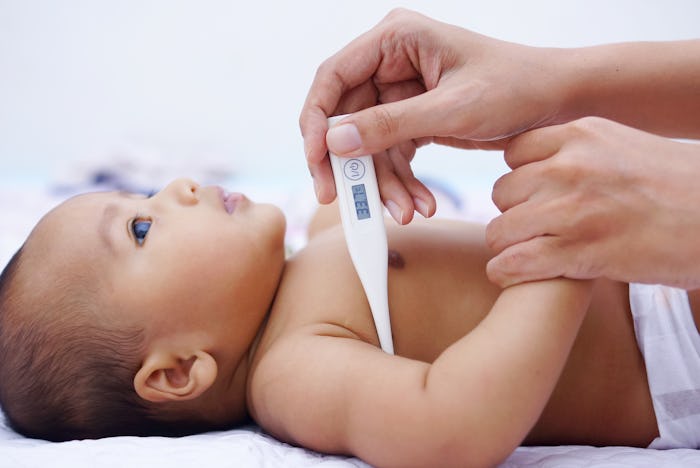Life
5 Signs Your Baby Has The Dreaded Stomach Bug & Needs Some Extra Hugs
Of all the dread-inducing moments you'll experience as a new parent, there are few quite so unpleasant as the very first time your baby throws up (or exhibits some other sign of gastrointestinal distress). Of course the fear is that your child has picked up some awful virus that's going to keep you both up all night covered in vomit — but wait, how can you tell if she's actually sick? Babies spit up and have weird poops like, all the time. What are the signs your baby has a stomach bug, for real?
First of all, it should be noted that while the term "stomach flu" is commonly used to describe these types of illnesses, the flu virus has nothing to do with stomach bugs, according to the American Academy of Pediatrics. Instead, these are most commonly caused by norovirus and rotavirus (or similar viruses, like enterovirus, astrovirus, and Norwalk virus). Kids under the age of 2 are usually hit hardest by the extremely contagious rotavirus, though the increasing usage of a vaccine (given to babies at 2, 4 and 6 months of age) which protects children against five types of rotavirus might mean that your little one is spared (but it might not).
Norovirus, meanwhile, is the "leading cause of illness and outbreaks from contaminated food in the United States," according to the Centers for Disease Control and Prevention, and also spreads quickly in "closed places like daycare centers, nursing homes, schools, and cruise ships." (All those cruise ship illness outbreak horror stories? Blame norovirus.)
Ultimately, however, the symptoms for most stomach viruses are similar, as are the treatments: rest, extra fluids, even more rest, and extra, extra fluids. And those symptoms are definitely a lot different than non-stomach bug gastric disturbances — so if your baby is legitimately ill, you'll know for sure before long! (Also, take note: Some of the earlier symptoms aren't as dramatic as what's waiting in the wings, so you might miss them if you're not looking.)
1Your baby is fussier than usual
Babies are moody little creatures, so the question of whether or not your child is fussier than usual might seem a difficult one to answer — but increased irritability could be a sign of an impending tummy bug, according to Parents.
2Your baby doesn't have much of an appetite
Did you know your baby could have a stomach bug and not end up puking at all?
“Some kids will just have a stomachache and a decreased appetite, some will have just vomiting or diarrhea, and some will have the wonderful combination of both,” Barbara Frankowski, MD, professor of pediatrics at Vermont Children’s Hospital in Burlington, told Parenting.
But whether or not she ever throws up, chances are she won't have much interest in eating if she has a stomach bug (well, would you?).
3Your baby has a fever
She might not be able to tell you that her body aches or she has the chills, but you'll know for sure if she has a fever — which can absolutely be a symptom of a stomach bug, explained BabyCenter.
4Your baby is vomiting
Probably the most obvious clue that your baby has a bug, vomiting (throwing up more than the volume produced when your baby generally spits up) oftentimes doesn't last longer than 24 hours with a typical stomach virus, according to the American Academy of Pediatrics. That's not always the case, though, and if you rush solids (or even liquids) too quickly you're more likely to start the whole terrible cycle over again. So talk to your doctor, and proceed with caution!
5Your baby has diarrhea
Another telltale sign of sickness, here's the worst thing about baby diarrhea (besides that it's, well, diarrhea and your baby has it): It can hang around for awhile. As David B. Nelson, MD, chair and professor of pediatrics at Georgetown University Hospital in Washington told Parents, "Children tend to throw up for just the first day or two, but diarrhea can last more than a week."
Lovely! Diarrhea can also quickly dehydrate kids, so be sure to check with your pediatrician about the best way to keep your child hydrated (depending on age, the doctor might recommend Pedialyte or just keeping up with breastfeeding).
Check out Romper's new video series, Bearing The Motherload, where disagreeing parents from different sides of an issue sit down with a mediator and talk about how to support (and not judge) each other’s parenting perspectives. New episodes air Mondays on Facebook.
